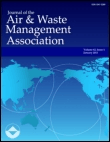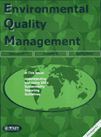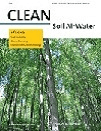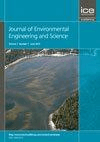
JOURNAL OF THE AIR & WASTE MANAGEMENT ASSOCIATION
Scope & Guideline
Transforming Knowledge into Action for Environmental Excellence
Introduction
Aims and Scopes
- Air Quality Assessment and Management:
Research focusing on the evaluation, modeling, and management of air quality, including the impacts of pollutants on human health and ecosystems. - Waste Management and Recycling:
Studies on the management, treatment, and recycling of municipal solid waste, industrial waste, and hazardous materials, including innovative technologies and practices. - Environmental Justice and Public Health:
Investigations into the intersection of environmental issues and public health, particularly regarding vulnerable populations and the implications of environmental policies. - Climate Change and Sustainability:
Research addressing the implications of climate change on air quality and waste management, including mitigation strategies and sustainable practices. - Innovative Environmental Technologies:
Development and evaluation of new technologies for pollution control, waste treatment, and resource recovery, emphasizing practical applications and effectiveness.
Trending and Emerging
- Data-Driven Environmental Monitoring:
The use of advanced monitoring techniques, including mobile laboratories and low-cost sensors, is on the rise, emphasizing real-time data collection and analysis for better decision-making. - Circular Economy Approaches:
Research focusing on circular economy principles within waste management, including resource recovery and sustainable practices, is trending as industries seek more sustainable operations. - Impact of Climate Change on Air Quality:
Studies exploring the relationship between climate change and air quality dynamics are increasingly prominent, reflecting the urgent need to address interconnected environmental challenges. - Environmental Justice Frameworks:
There is a notable increase in research addressing environmental justice, focusing on the disproportionate impacts of pollution on marginalized communities and advocating for equitable solutions. - Innovative Waste Treatment Technologies:
Emerging technologies for waste treatment, including bioremediation and advanced recycling methods, are gaining traction as researchers explore their effectiveness and implementation.
Declining or Waning
- Traditional Pollution Control Methods:
Research that relies on conventional pollution control technologies is becoming less prominent as newer, more innovative solutions gain traction in the field. - Generalized Environmental Assessments:
Studies that provide broad assessments without specific focus on particular pollutants or technologies are declining, as there is a growing preference for detailed, case-specific analyses. - Non-Urban Air Quality Studies:
Research centered on air quality in rural or non-urban settings has decreased, possibly due to a shift in focus towards urban pollution issues and their complex dynamics. - Static Waste Management Practices:
The exploration of static waste management practices without consideration of dynamic systems and circular economy principles is becoming less relevant in light of evolving sustainability frameworks.
Similar Journals

Environment Protection Engineering
Fostering Innovation for a Cleaner PlanetEnvironment Protection Engineering is a peer-reviewed academic journal published by Technical University of Wroclaw, dedicated to advancing knowledge and research in the fields of environmental engineering and waste management. With a rich publishing history dating back to 1980, the journal encompasses a wide spectrum of topics, from innovative engineering solutions to the effective management of waste, promoting sustainable practices and environmental protection methodologies. Despite its recent classification in the Q4 quartile of both Environmental Engineering and Waste Management and Disposal, the journal serves as a critical platform for researchers, professionals, and students seeking to disseminate their findings and engage with current challenges faced in environmental science. Located in Poland, the journal supports the scholarly community by providing insightful articles that contribute to the discourse surrounding environmental sustainability. Though currently not available as an open-access publication, it remains an essential resource for those aspiring to deepen their understanding of pressing ecological issues and solutions.

ENVIRONMENTAL SCIENCE AND POLLUTION RESEARCH
Elevating Awareness of Environmental and Health IssuesEnvironmental Science and Pollution Research is a premier international journal published by Springer Heidelberg, dedicated to advancing knowledge in the field of environmental science and pollution. With an impressive impact factor reflecting its vital contributions to research, the journal is categorized in the top quartiles (Q1 and Q2) across several domains, including Health, Toxicology and Mutagenesis, and Environmental Chemistry. Established in 1994, it continues to be a critical resource for researchers, professionals, and students focusing on pressing environmental issues. The journal provides an insightful platform for disseminating significant findings related to pollution and its effects on health and the environment, contributing to a better understanding and resolution of these challenges. While it currently does not offer Open Access options, its inclusion in prominent rankings, such as the Scopus rankings, underscores its reputation and influence within the scientific community.

Advances in Environmental Research-An International Journal
Pioneering Research for a Greener TomorrowAdvances in Environmental Research is an international journal published by TECHNO-PRESS, dedicated to advancing our understanding of environmental science and sustainability. Operating with an ISSN of 2234-1722 and an E-ISSN of 2234-1730, this journal serves as a premier outlet for researchers, professionals, and students aiming to share pioneering research findings, case studies, and reviews that address contemporary environmental challenges. The journal aims to provide a platform for scholarly discussion on a wide range of topics, including pollution control, resource management, and ecological conservation. Though currently classified as a non-open access journal, it remains accessible through various institutional subscriptions, allowing a broad audience to engage with its content. Committed to fostering academic collaboration and innovation, Advances in Environmental Research plays a crucial role in informing policymakers and the scientific community about emerging trends and solutions in environmental studies, making it an essential resource for those dedicated to creating a sustainable future.

ENVIRONMENTAL ENGINEERING SCIENCE
Exploring innovations in environmental science and engineering.ENVIRONMENTAL ENGINEERING SCIENCE is a leading journal published by MARY ANN LIEBERT, INC that provides a platform for pioneering research in the fields of environmental chemistry, pollution control, and waste management. With an ISSN of 1092-8758 and an E-ISSN of 1557-9018, this peer-reviewed journal aims to disseminate high-quality scientific studies that address critical environmental challenges. As evidenced by its 2023 category quartile rankings, it holds a notable position at Q3 in Environmental Chemistry and Pollution and Q2 in Waste Management and Disposal, highlighting its relevance and impact in these domains. Spanning over two decades from 1997 to 2024, the journal is dedicated to fostering innovations and promoting rigorous scholarship that can contribute significantly to sustainable environmental practices globally. Authors and researchers are encouraged to engage with this essential resource, which offers Open Access options to enhance the visibility and reach of their work. For those interested in advancing their understanding and practice within the environmental sciences, ENVIRONMENTAL ENGINEERING SCIENCE is an indispensable journal to consider.

Water Conservation Science and Engineering
Transforming Water Challenges into Engineering SolutionsWater Conservation Science and Engineering, published by SPRINGERNATURE, is a vital academic journal dedicated to advancing the fields of environmental engineering, ocean engineering, waste management, and water science and technology. Since its inception in 2016, the journal has quickly established itself within the academic community, achieving a commendable Q3 ranking across multiple categories in 2023. With an ISSN of 2366-3340 and an E-ISSN of 2364-5687, it is accessible to a global readership eager to explore the latest research and innovations in water conservation and sustainable practices. Although currently not open access, the journal is committed to publishing high-quality scholarly articles that provide insights into effective water management strategies, innovative engineering solutions, and the critical importance of preserving our water resources. Based in Singapore, Water Conservation Science and Engineering aims to foster interdisciplinary collaboration among researchers, professionals, and students, making it an essential resource for anyone passionate about environmental sustainability and preservation.

Asian Journal of Water Environment and Pollution
Exploring innovative pathways to cleaner water.Asian Journal of Water Environment and Pollution is a leading academic journal published by IOS PRESS, dedicated to advancing the field of water science and technology, as well as pollution management. With its ISSN 0972-9860 and E-ISSN 1875-8568, this journal serves as a pivotal platform for researchers, professionals, and academics alike who are keen to explore innovative solutions and interdisciplinary approaches toward water-related challenges and environmental issues. Although currently positioned in the Q4 category for both pollution and water science & technology, the journal aims to foster impactful research and discussions that can enhance the understanding and treatment of water pollution. The Asian Journal of Water Environment and Pollution not only plays a crucial role in disseminating knowledge but also encourages the sharing of findings from unique geographic perspectives, particularly from Asia. As the field evolves, this journal is poised to become a vital resource for those looking to contribute to sustainable water management practices and pollution reduction strategies.

Rocznik Ochrona Srodowiska
Exploring Innovative Solutions for Environmental ChallengesRocznik Ochrona Srodowiska, published by the Middle Pomeranian Scientific Society for Environmental Protection, is an esteemed journal dedicated to advancing the field of environmental science in Poland and beyond. With an ISSN of 1506-218X, this peer-reviewed journal has established itself as a vital resource since its inception in 2007, addressing various environmental issues and promoting sustainable practices. Currently holding a Q3 category ranking in the Environmental Science (miscellaneous) field for 2023, it places itself in the 23rd percentile of Scopus rankings, reflecting a growing influence in the broader environmental research community. While the journal is not open access, it serves as an important conduit for researchers, professionals, and students to disseminate their findings and contribute to the interdisciplinary dialogue aimed at tackling pressing environmental challenges. With a commitment to rigorous research and practical applications, Rocznik Ochrona Srodowiska remains an essential platform for fostering innovation and collaboration in environmental studies.

ENVIRONMENTAL QUALITY MANAGEMENT
Elevating Standards in Environmental Research and ManagementENVIRONMENTAL QUALITY MANAGEMENT is a respected journal published by WILEY, focusing on interdisciplinary studies that merge environmental science with public health, management, policy, and law. Since its inception in 1991, this journal has provided a platform for researchers and practitioners to share innovative insights and advancements in understanding environmental quality and its impacts on human health and the ecosystem. With an ISSN of 1088-1913 and an E-ISSN of 1520-6483, it holds a significant position in the academic community, evidenced by its presence in the Q3 quartile across several categories, including Management, Monitoring, Policy and Law, as well as Pollution and Waste Management. Although it is not an open-access journal, it continues to be a vital resource for those in the environmental sector, offering robust evaluations and discussions that advance knowledge and foster improved practices. With Scopus rankings demonstrating its relevance among other titles in the field, ENVIRONMENTAL QUALITY MANAGEMENT plays a crucial role in shaping discourse and informing policy in an increasingly vital area of study.

CLEAN-Soil Air Water
Empowering Global Knowledge in Environmental ScienceCLEAN-Soil Air Water, an esteemed journal published by Wiley, serves as a vital platform for disseminating research in the fields of environmental chemistry, pollution, and water science and technology. Operating under an Open Access model, it embraces the principles of knowledge sharing, making significant research findings readily accessible to a global audience. With an ISSN of 1863-0650 and an E-ISSN of 1863-0669, the journal has demonstrated its importance in the academic community, reflected in its Scopus rankings within the top quartiles of its categories. Established in 2007 and continuing through to 2024, CLEAN-Soil Air Water offers researchers, professionals, and students an opportunity to explore innovative studies that address pressing environmental challenges, facilitating an exchange of novel ideas and techniques essential for sustainable development. With a publication footprint in Germany and a growing international reputation, this journal is an invaluable resource for those dedicated to advancing the science and practices of environmental stewardship.

Journal of Environmental Engineering and Science
Bridging Science and Practice for Environmental ProgressJournal of Environmental Engineering and Science, published by Emerald Group Publishing Ltd, is a prominent academic platform dedicated to the dissemination of cutting-edge research in the fields of environmental engineering, chemistry, and science. This journal, with ISSN 1496-2551 and E-ISSN 1496-256X, features a comprehensive collection of studies that delve into innovative methodologies and practical applications aimed at solving pressing environmental issues. Having been published since 2002, it spans critical research years from 2015 to 2024, offering insights that are invaluable to both academics and practitioners alike. With its current rankings placing it in the fourth quartile for Environmental Chemistry and Engineering, and the third quartile in miscellaneous Environmental Science, the journal serves as a significant yet under-utilized resource for emerging scholars seeking to contribute to the ecological discourse. Though it does not offer Open Access, the content is meticulously curated to uphold academic rigor, catering especially to researchers, professionals, and students keen on advancing their understanding of environmental challenges and engineering solutions.